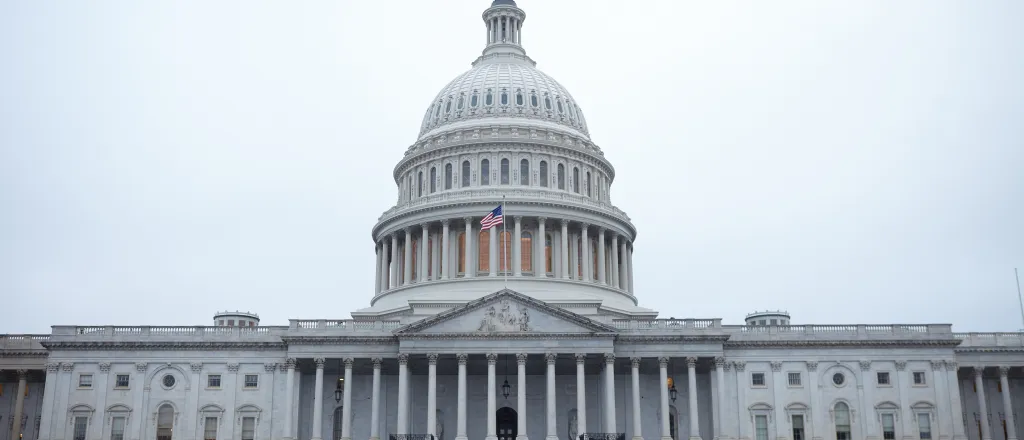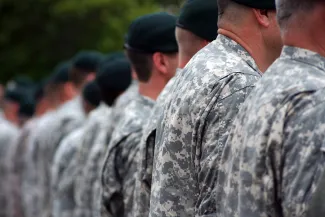
US Senate rejects restriction of military strikes on vessels in the Caribbean
The U.S. Senate failed to advance Wednesday night a resolution designed to curb the president’s power regarding military actions abroad after the Trump administration ordered four strikes on boats in the Caribbean.
The resolution failed to advance 48-51. Democratic Senators Adam Schiff of California and Tim Kaine of Virginia forced a procedural vote on the measure, which would have blocked the Trump administration from engaging in hostilities abroad without congressional approval.
Two Republicans, Senators Rand Paul of Kentucky and Lisa Murkowski of Alaska, joined nearly all Democrats voting in favor. Senator John Fetterman of Pennsylvania was the only Democrat to vote against advancing the measure.

© iStock - icholakov
Democratic U.S. Senators Tim Kaine of Virginia and Adam Schiff of California hold a pen-and-pad press conference with reporters in the U.S. Capitol on Oct. 8, 2025 ahead of the Senate’s vote on their resolution to limit the president’s military power abroad. (Photo by Ariana Figueroa/States Newsroom)
The War Powers Resolution of 1973 is a tool for Congress to check the balances of power of the executive branch by limiting the president’s ability to initiate or escalate military actions abroad.
Since September, President Donald Trump has approved four known military strikes in the Caribbean that have killed 21 so far, and, without offering evidence, said the boats were used by drug cartel members.
“We call them water drugs,” Trump said about the most recent known boat strike on Oct. 3. “The drugs that come in through the water.”
The White House has released few details of the strikes.
Secretary of Defense Pete Hegseth, also without providing any evidence, said on social media that the boats contained narcotics heading for the U.S.
“Our intelligence, without a doubt, confirmed that this vessel was trafficking narcotics, the people onboard were narco-terrorists, and they were operating on a known narco-trafficking transit route,” Hegseth wrote. “These strikes will continue until the attacks on the American people are over!!!!”
Those attacks have taken place in international waters off the coast of Venezuela, Hegseth added.
Venezuelan President Nicolas Maduro, in a statement, condemned the attacks as an “illegal incursion of combat aircraft from the United States.”
Use of military
It’s illegal for the U.S. military to intentionally kill civilians who are not actively taking part in hostilities against the U.S.
Senate Democrats and some Republicans have expressed skepticism about claims from the Trump administration that the boats were affiliated with drug cartels and have pushed the White House for more information on the boat strikes.
Kaine said it’s possible that more people have died in the boat strikes, but they are seeking that information. He added that the strikes circumvent Congress’ authority to declare war.
“We are vested with the power of declaring war. We ask basic questions,” Kaine, who sits on the Senate Armed Services Committee, said. “Give us the intel about these particular boats, that they’re actually carrying narcotics.”

© iStock - ethanfink
The Trump administration has argued that the strikes on the boats don’t warrant notification to Congress because they don’t rise to the level of war, and that the attacks are in self-defense. Kaine said he rejects those arguments.
“That’s just an invented rationale,” he said. “Self-defense has always been understood (as) imminent attack, imminent invasion of the United States. It is not within the norm of self-defense to define a drugrunner’s operation.”
Paul said he is working on getting a briefing from the White House about the strikes and was skeptical that in the most recent strike, the four people killed were affiliated with drug cartels.
“If they’re members of a gang and you know them to be terrorists, and you’re convinced enough to kill them, why shouldn’t you know their names?” Paul said.
Schiff said that since the first U.S. military attack near Venezuela in early September, the White House has not answered his and other lawmakers’ questions on those missions.
“We just have little or no information about who was on board these ships, or what intelligence was used, or what the rationale was, and how certain we can be that everyone on that ship deserved to die,” he said.
Congress passed the War Powers Resolution in 1973 to limit the president’s authority to wage war overseas after the Nixon administration secretly bombed Vietnam and Cambodia, killing hundreds of thousands of people. Then-President Richard Nixon vetoed the resolution, but Congress overrode the veto.
















